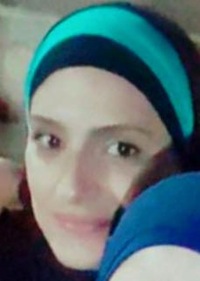Before she was murdered by her ex-husband, Huda Abu Sarir was betrayed by the rest us. She was murdered because we raise men unstable men alongside strong, steadfast women.

I drove into the tiny, empty Jaffa alleyway on my way to the home of Huda Abu Sarari, an Arab woman who was murdered by her ex-husband a week earlier. I had a long list of questions and dilemmas following a discussion I held earlier that day with activists from Jaffa: should we demonstrate against our society or against the establishment, which oppresses us? Is this the pure struggle of Palestinian women, or does our common fate tie us to others? Should we invite political parties? Should we speak about violence generally, or only gender violence?
I sat and pondered these questions, yet I could barely speak a word and couldn’t hold back my tears. The women told me the hard truth about Huda; listening to them I realized that my dilemmas were nothing compared to her life, which was cut short last week. Here, around the table set up to prepare Huda for her burial, one can find all the answers. Soon, the white sheet will cover her body, and the truth will be buried in the wet sands of the sea, which she loved so much.
‘Like a monster’
Huda Abu Sarari was forced into an engagement at 14 years old — only her mother managed, after much difficulty and pain — to delay the wedding until she was 14. At 19 she was already a mother. Tell me: was this not a murder? The death of a dream? The end of her future? The killing of a blossoming, strong woman?
These walls and the small courtyard have witnessed many screaming matches, they have been struck many times. Here and there they have seen blood. “This is how we were raised, sit aside and shut up,” Eness, Huda’s only sister, said as tears streamed down her face. Men are born with power and total control, as if it were an inseparable part of their being.
Huda divorced after much suffering, returned to her family’s home and dreamt of turning over a new leaf — one that would allow her to study, work, and simply live. But a divorced woman is treated like a monster, a ticking bomb. She is erased. “As if she weren’t a human being,” says her aunt. She cannot dress up, go out, put on perfume. “I told him before: it isn’t perfume, it’s only body cream,” she added. “It didn’t help, and he hit her. He was possessive of her.” Was he possessive or jealous, I asked. Everyone remained silent.

Huda, who so loved human beings, was murdered. She loved humans, yet no one helped her. She was murdered dozens of times before her soul left her body. We betrayed her, time after time. She was murdered because we raise men unstable men alongside strong, steadfast women. They tie their pride to our fate. An empty masculinity that takes our love and grows to eradicate us.
How many women like Huda Abu Sarari do you know?
“This sick society won’t change until we bring justice for our women,” said an elderly woman who came to the mourning tent from Acre. “How is Jaffa different from Acre, Lod, or Ramle? The situation is the same. Men are failures, yet it’s all our fault.”
My women, we cannot despair. We cannot raise a white flag. Do not wait for the messiah, do not expect redemption. This is our time. We are with the women, alongside us are the few good men. We are many. We will win, undoubtedly. One day a different sun will rise here — one of freedom and liberty. Be sure that we will pay a heavy price, we will shed tears and blood. We have no alternative — we must try, we must struggle, we must hug one another.
Do not fear revolution, my women. Your voice is your sword. If we do not live to see victory and salvation in our generation, we will bear the next one — a generation that fights for women’s rights.
A version of this article was first published in Hebrew on Local Call. Read it here.

